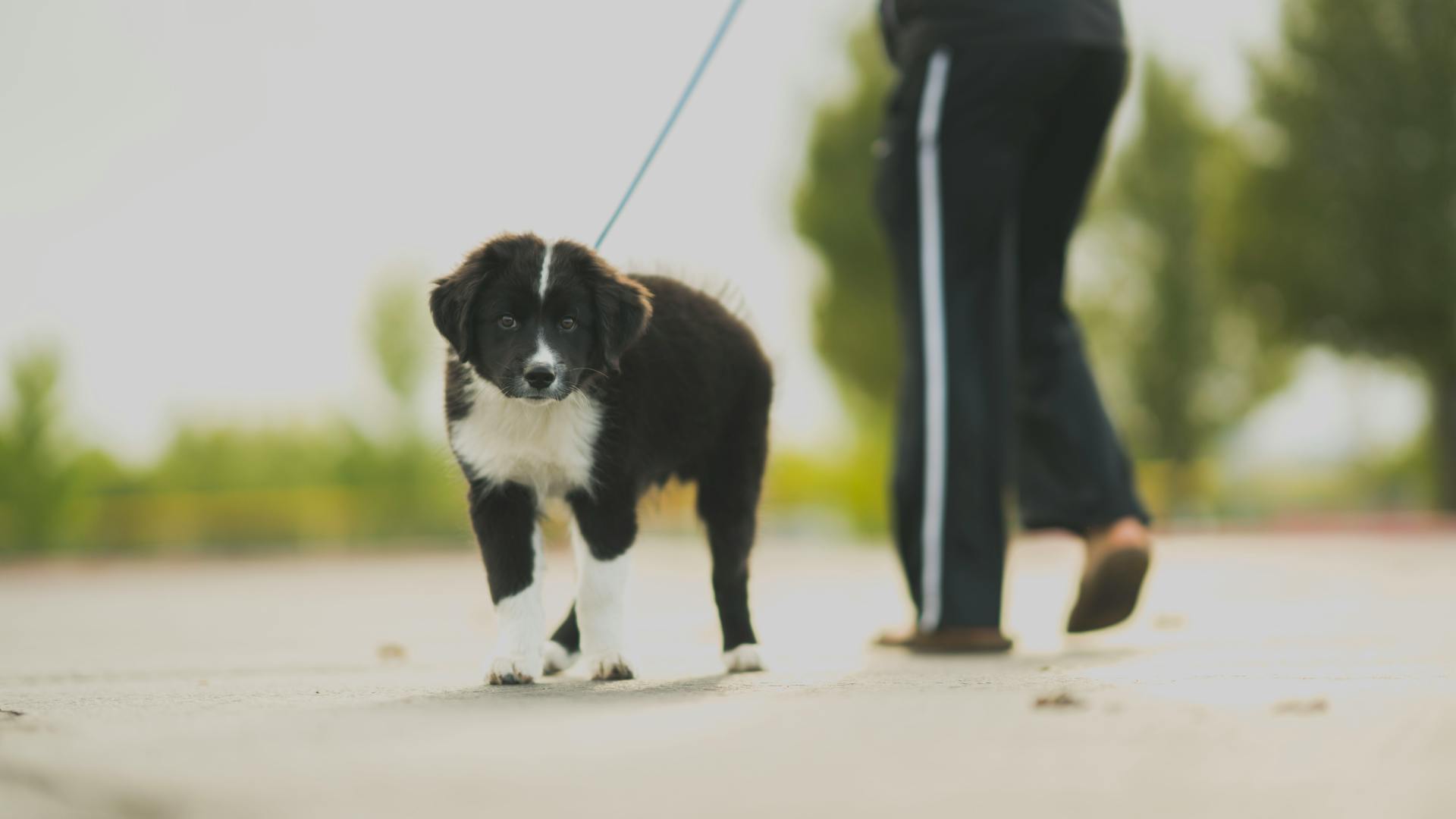
Black Border Collies are a unique and special breed, and understanding their needs and characteristics is essential for any potential owner. They have a thick, double coat that sheds heavily, especially during shedding season.
Black Border Collies are highly intelligent dogs that thrive on mental and physical stimulation. They require regular exercise and training to prevent boredom and destructive behavior.
In terms of health, Black Border Collies are generally a healthy breed, but they can be prone to certain health issues such as deafness and collie eye anomaly. Regular veterinary check-ups can help identify any potential issues early on.
Black Border Collies are loyal and loving companions that make great family pets, but they do require a lot of attention and interaction from their owners.
Health and Care
Black Border Collies require a lot of mental and physical stimulation every day, so be prepared to engage them in activities that challenge their bright minds and bodies.
They need a securely fenced yard or a country farm to prevent them from chasing cars and other animals. If you don't have a farm with sheep, dog sports are a great alternative to keep them occupied.
Black Border Collies shed all year round, so get ready for regular grooming to prevent matting and keep their coat looking healthy and shiny. They'll need to be brushed more frequently during the heavier shedding seasons.
Daily exercise is crucial to prevent destructive behavior like chewing on furniture, scratching at doors, and barking excessively. Activities like agility training, playing fetch, and jumping for frisbees are perfect for keeping them happy and healthy.
Worth a look: Do Border Collies Need to Be Groomed
Breed Maintenance
Border Collies are average shedders and need regular grooming to prevent matting and keep their coat looking healthy and shiny. They shed all year round, but more during heavier seasons.
Brushing their coat once or twice a week is a good rule of thumb, with daily brushing during shedding season. This will help keep their coat oils well distributed and prevent matting.
They'll only need a bath every few months, unless they get dirty or smelly. However, regular brushing is essential to prevent hair from getting matted.
Border Collies need daily physical and mental stimulation to prevent destructive behavior, such as chewing on furniture or barking excessively. This can include activities like agility training, playing fetch, or simply running around with them.
Regular nail trimming is also a must, ideally once a month if needed. Brushing their teeth regularly, at least two or three times a week, will help prevent gum disease and bad breath.
Their ears need regular cleaning, ideally once a week, to prevent infections and bad odors. A weekly exam will also help you spot potential health problems early on.
A different take: Shiba Inu Reaching 1 Cent
Health
Border Collies are generally a healthy breed, but like all dogs, they can be prone to certain health issues. Some of the most common health problems in Border Collies include hip dysplasia, a condition that occurs when a dog's hip joint doesn't develop properly.
Related reading: Bernese Mountain Dog Hip Dysplasia
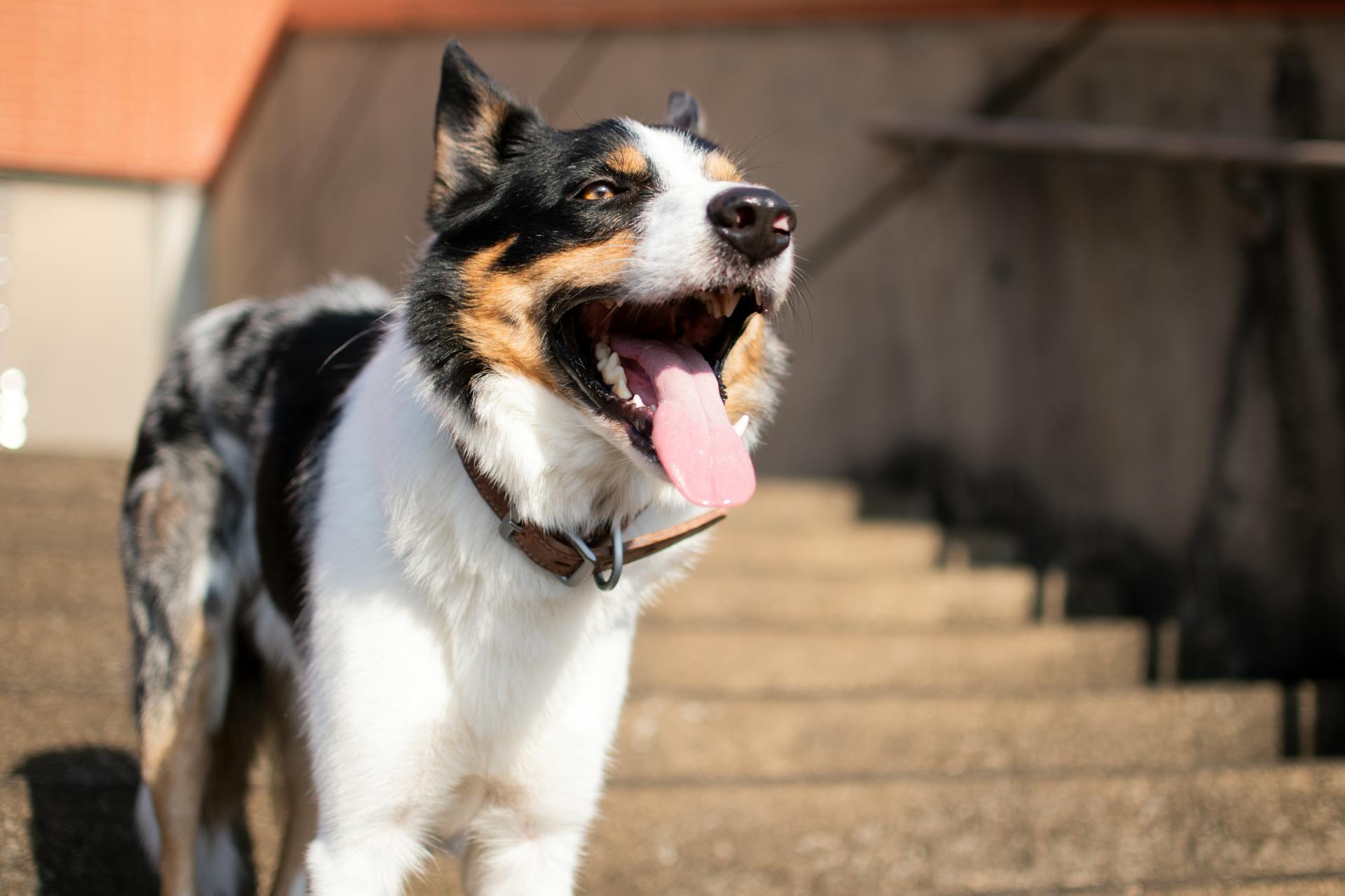
Progressive Retinal Atrophy (PRA) is another condition that can affect Border Collies, causing gradually progressive degeneration of the retina. Pannus, a condition that affects the eyes, and hypothyroidism, a condition that affects the thyroid gland, are also common health issues in this breed.
Epilepsy, a brain disorder that causes seizures, is another condition that can affect Border Collies. Lens Luxation, a condition that affects the lens in the eye, and Multidrug Resistance, a condition that makes certain medications less effective, are also possible health concerns.
Some Border Collies may be born with genetic conditions such as Collie Eye Anomaly (CEA), which impairs vision, or Neuronal Ceroid Lipofuscinoses (NCLs), a group of inherited neurodegenerative disorders.
Here are some common health issues that can affect Border Collies:
- Hip Dysplasia
- Progressive Retinal Atrophy (PRA)
- Pannus
- Hypothyroidism
- Osteochondritis Dissecans
- Portosystemic Shunt
- Epilepsy
- Lens Luxation
- Collie Eye Anomaly (CEA)
- Neuronal Ceroid Lipofuscinoses (NCLs)
Having pet insurance can help reduce the stress of expensive vet bills and give you the peace of mind of knowing that your four-legged friend is protected.
Average Lifespan
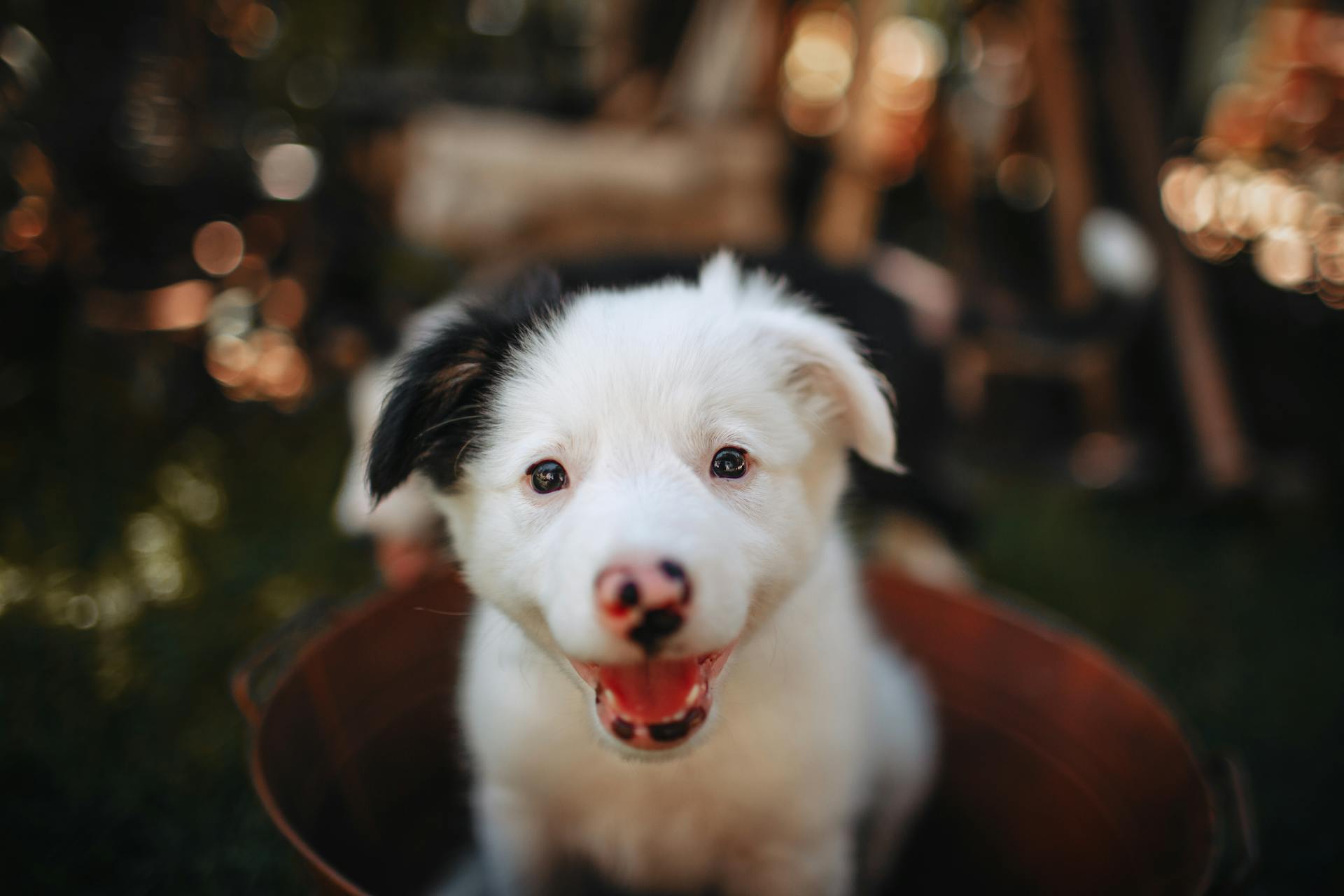
The average lifespan of a Border Collie is relatively long at 10 to 15 years, although some members of the breed can reach 17 years old.
Regular exercise, a healthy diet, and regular veterinarian visits are crucial for a Border Collie to live a long and happy life.
If your Border Collie is treated well, they have a much better chance of living a long and happy life.
Border Collies who live up to 17 years old are not uncommon, and with proper care, your furry friend can join the ranks of the long-lived Border Collies.
The oldest Border Collie on record is Bramble, who lived in the UK from 1975 to 2003, an impressive 28 years.
Expand your knowledge: English Bulldog 100 Years Ago
Exercise Needs
Border Collies are extremely energetic dogs that require a lot of exercise every day. They need at least two hours of vigorous physical activity to keep them happy and healthy.
They do best when given a job to do, which can be anything from herding sheep to participating in dog sports like agility and flyball. This mental stimulation is just as important as physical exercise for their overall well-being.
Additional reading: How Much Exercise Do Border Collies Need
Border Collies are highly intelligent and respond well to praise, making them a joy to train and interact with. They're also very trainable, which is great for owners who want to teach them new skills and activities.
If you don't have a farm with sheep, dog sports are a great alternative for providing your Border Collie with the mental and physical stimulation they need. This can be a fun and rewarding way to spend time with your dog and challenge them in new ways.
Border Collies can live up to 18 years, so it's essential to find activities that you and your dog can enjoy together for many years to come. With the right exercise and mental stimulation, your Border Collie will thrive and become a beloved member of your family.
Related reading: Boston Terrier New England
Temperament and Training
The temperament and training of black Border Collies are just as impressive as their physical appearance. They are extremely intelligent and thrive on learning, making them easy to train.
Border Collies are known to be high-energy dogs that require a lot of exercise and mental stimulation to prevent destructive behavior. They need at least two hours of exercise per day, preferably in the form of running, hiking, or playing fetch.
Early socialization is crucial for black Border Collies to prevent shyness around strangers. This should start from an early age and continue throughout their life to provide enough mental stimulation and deter negative behaviors like nipping and running off to chase cars.
Border Collies are very responsive to praise and do well in obedience training, which should start from an early age and continue throughout their life. They are also known to excel in canine activities such as agility, herding, and obedience.
Here are some key training tips for black Border Collies:
- Start obedience training from an early age and continue throughout their life.
- Provide enough mental stimulation through training and activities that require them to think.
- Use praise and positive reinforcement to encourage good behavior.
- Exercise them for at least two hours a day to prevent destructive behavior.
Border Collies are known to be loyal and affectionate dogs, but they can also be strong-willed and independent. They require a lot of attention and exercise to stay happy and healthy.
Getting a Pet
If you're considering bringing a black Border Collie into your life, it's essential to check out the Border Collie Society of America's breeder referral directory and list of rescue groups throughout the States.
Researching similar breeds like German Shepherds, Australian Shepherds, Canaans, and Shetland Sheepdogs can also be a great starting point.
Welcoming a new pet into your family requires careful consideration and planning, so make sure to do your research and find a reputable breeder or rescue organization.
If you're new to dog ownership, you may want to start by volunteering at a local animal shelter to gain experience and learn more about the needs of your future pet.
If you're ready to bring a black Border Collie home, prepare to provide plenty of exercise and mental stimulation to keep them happy and healthy.
For more insights, see: New Dog Breed Lancashire Heeler
Nutrition and Diet
Black Border Collies require a high-calorie diet with protein-rich foods like chicken, duck, beef, or fish as the main ingredient.
Their diet should be divided into two to three meals a day, depending on their age, with adult dogs needing only two meals a day.
You should aim to provide around 1,000 calories a day, although this can vary based on their size, age, and activity level.
It's essential to monitor their calorie intake and adjust accordingly to prevent weight gain, especially as they get older.
Border Collies generally need about three-quarters to one full cup of dry dog food twice a day, with fresh water available at all times.
Their exact nutritional requirements may vary, so it's always best to consult with a veterinarian for personalized advice.
Best Diet Options
Border Collies are an active breed, so they need a high-calorie, good quality diet.
Their main ingredient should be protein such as chicken, duck, beef or fish instead of grains or byproducts.
Feeding them three times a day is ideal when they're puppies, but this can be reduced to two meals a day when they become an adult.
Intriguing read: When Do Border Collies Calm down
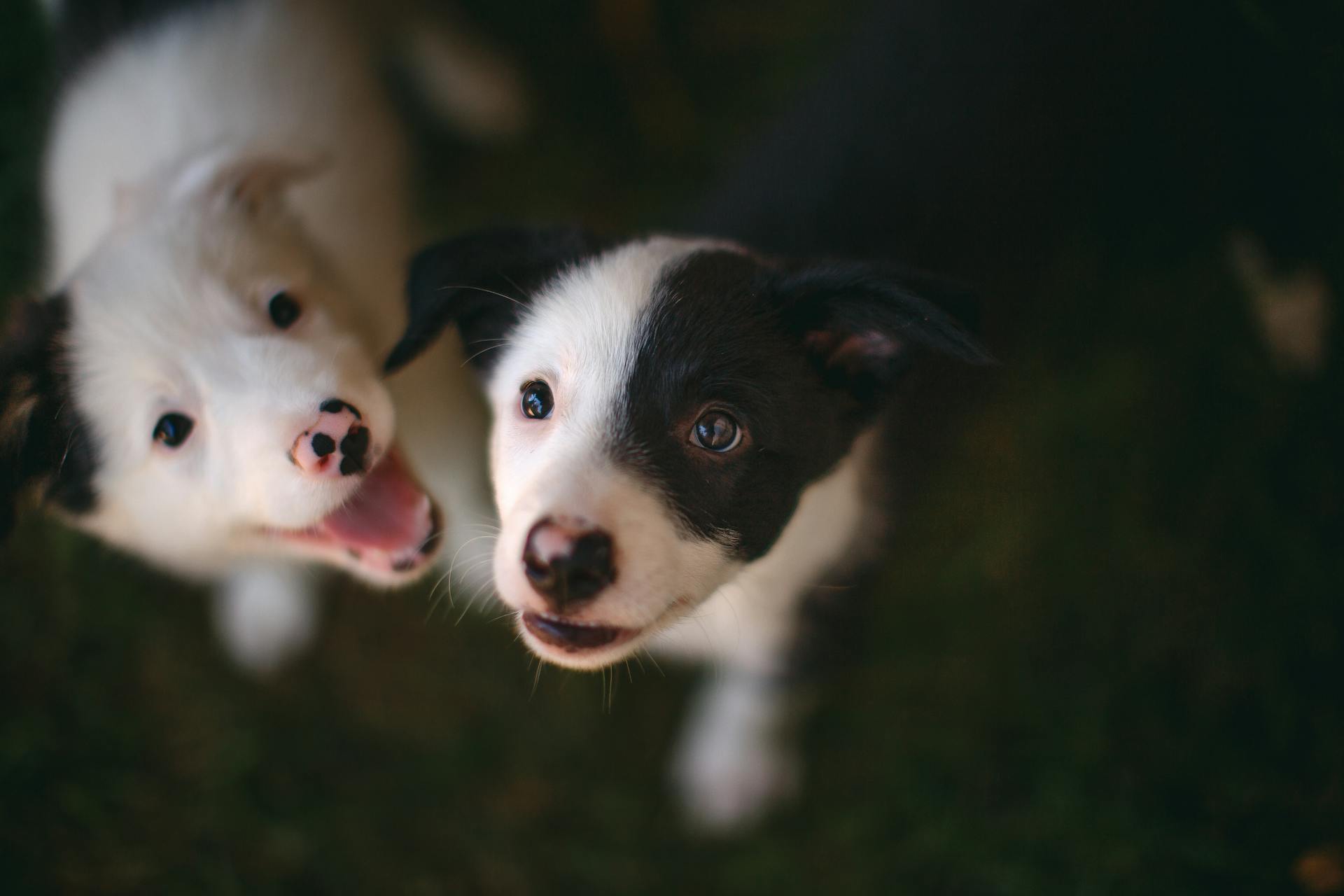
They need around 1,000 calories a day, although the exact amount will depend on their age and other factors.
You do need to be careful not to overfeed them, as they can become overweight despite their active lifestyle.
To ensure you're feeding your Border Collie the best possible diet, look for dog food with chicken, duck, beef or fish as the main ingredient.
Diet and Nutrition
Border Collies are active dogs that need a high-calorie diet with protein as the main ingredient, rather than grains or byproducts.
They require around 1,000 calories a day, although this can vary depending on their age and other factors.
Feeding your Border Collie three times a day is recommended for puppies, which can be reduced to two meals a day when they become an adult.
To avoid overfeeding, monitor your dog's weight and adjust their food intake accordingly, as they can easily become overweight despite their active lifestyle.
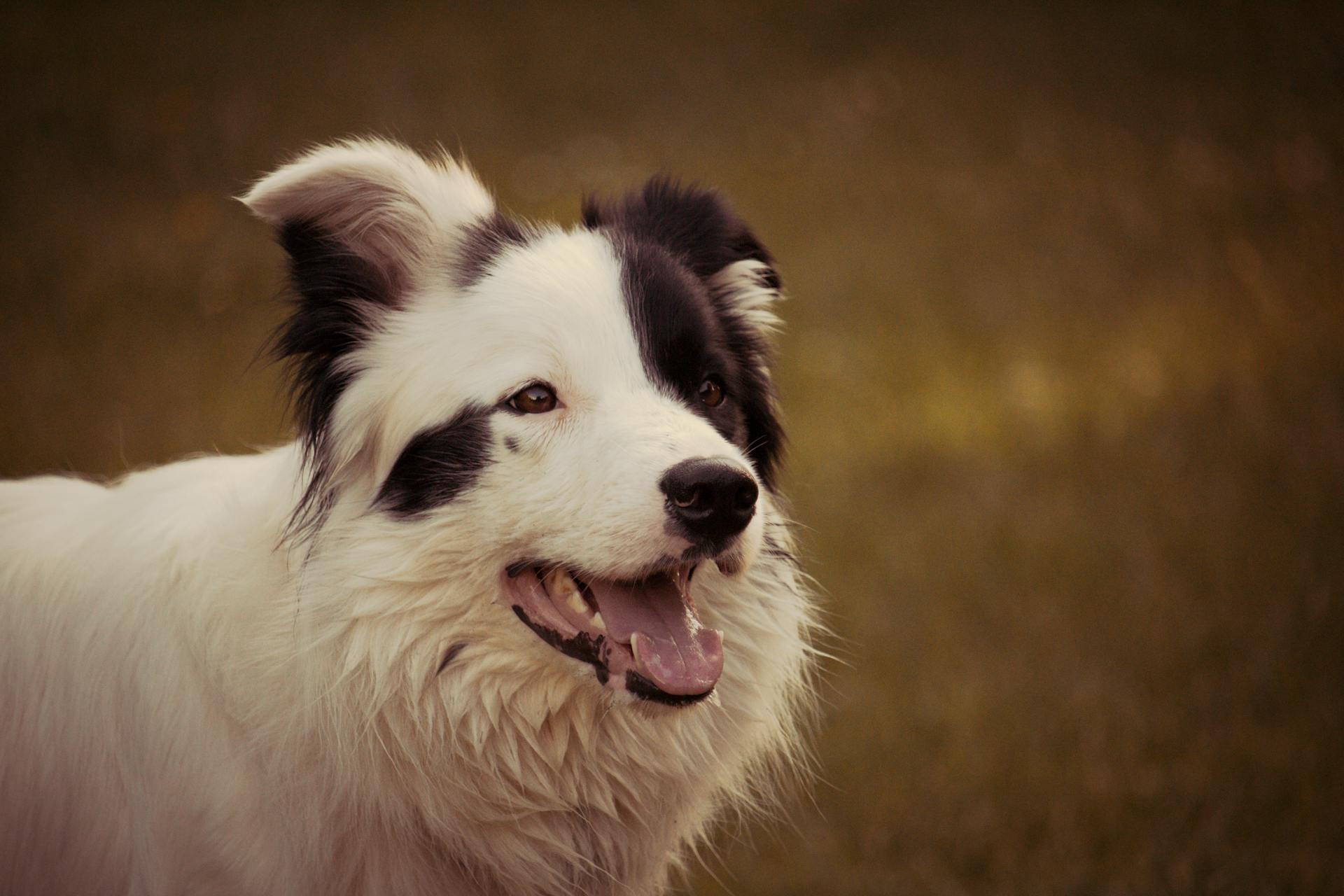
You should provide your Border Collie with fresh, clean water at all times, and consider consulting your veterinarian if you're unsure about the best food type or volume for your dog.
Their exact nutritional requirements may vary based on their size, age, activity level, and food brand.
A general guideline is to feed your adult Border Collie 1.5 to 2 cups of high-quality dry food a day, divided into two meals.
However, this can vary depending on your dog's individual needs, such as their size, build, and activity level.
Readers also liked: Best Food for Border Collies
General Information
Border Collies are highly active dogs that thrive on having a purpose, which makes them perfect for an active owner who can provide a stimulating lifestyle.
Their intelligence is among the highest in breeds, making them incredibly trainable.
Border Collies have an average lifespan of 10 to 15 years, although some have been known to live up to 18 years.
You can consider rescuing a Border Collie in need of a forever home, which can cost between $250 to $600.
Related reading: Bull Terrier Then and Now
Breed History
The Border Collie breed has a rich history that dates back to the first century B.C. when the Romans invaded England and brought their herding dogs with them.
These early herding dogs were cross-bred with the larger Roman herding dogs and a small Spitz-like herding dog brought by Viking raiders, producing a highly intelligent and hard-working breed.
The breed originated in Northumberland, which borders England and Scotland, and was known as the Sheepdog until 1915.
The name "Border Collie" was given to differentiate them from other similar breeds and reflects their partially Scottish heritage.
The breed's foundation sire, Old Hemp, was a top-quality Border Collie of the 1880s to 1900s who only barked to warn of danger.
Old Hemp's herding style, which involved staring down the sheep instead of nipping or barking at them, proved to be a success and he went on to win the first official sheepdog trial in Bala, Wales, in 1884.
Additional reading: Are German Shepherds Good for First Time Owners
The breed gained popularity after Old Hemp's win, and many American ranchers sent word back to Scotland and England asking for more herding dogs to be sent across the Atlantic.
The Border Collie was officially recognized by the AKC in 1995, and today it is recognized as the premier sheepherding dog.
Information and Pictures
You can find a wealth of information about the topic online, including detailed descriptions and images.
The pictures available online are often high-quality and include photographs and diagrams.
Some online resources also offer 3D models and videos to help you visualize the concept.
These visual aids can be especially helpful for understanding complex ideas and processes.
The images are often labeled and captioned to provide context and clarify their relevance.
You can also find infographics that summarize key statistics and data.
These visual representations can be a great way to quickly grasp the main points of a topic.
Frequently Asked Questions
Are all black Border Collies rare?
No, not all black Border Collies are rare, but black is a rare color in the breed. While it does occur, it's less common than other colors.
How much is a black Border Collie?
Border Collie prices range from $700 to $2,000, depending on the breeder and puppy quality. Black Border Collies may command higher prices due to their unique coat color.
Are there black Collies?
Yes, black Collies do exist, but only when both parents contribute a recessive black gene, resulting in a tri-color coat. This is a rare occurrence in the breed.
Can Border Collies be full black?
Yes, Border Collies can be genetically black, but it's rare and usually accompanied by small amounts of white markings. A full black Border Collie is possible, but not common.
Featured Images: pexels.com


